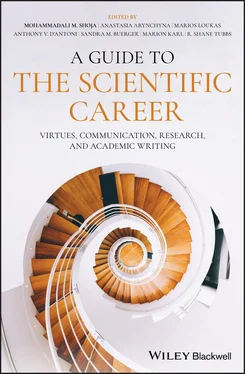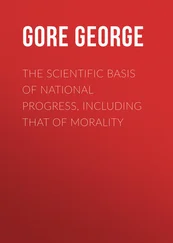UK
Genevieve Pinto Zipp
School of Health and Medical Sciences, Department of Graduate Programs in Health Sciences
Seton Hall University
South Orange, NJ
USA
“And those who were seen dancing were thought to be insane by those who could not hear the music.” Friedrich Nietzsche
Too often in academia, students and professionals are expected to be knowledgeable of the various practical nuances of research that are not readily available or are only learned by experience. Herein, we strive to present a well‐defined and comprehensive textbook that provides the academician with the most commonly encountered topics in higher education and research.
This textbook is an easy‐to‐read source of essential tips and skills for a scientific career. The topics have been chosen to be pragmatic and to enhance a career in academia, whether focused on didactics, basic science, or clinical research. There has seldom been any effort in the past to comprehensively and systematically address the academic lifestyle. A Guide to the Scientific Career fills a gap in this arena. It inspires and motivates research activity among a new generation of researchers all around the world.
Section I Successful Career
1 Defining and Re‐Defining Success
Mohammadali M. Shoja 1, R. Shane Tubbs 2, and Dan O'Brien 3
1Division of General Surgery, University of Illinois at Chicago Metropolitan Group Hospitals, Chicago, IL, USA
2Seattle Science Foundation, Seattle, USA
3Rhazes Publishing, Birmingham, AL, USA
The life of a human being in the modern era is centered on a struggle to succeed and attain whatever is initially thought near‐impossible or very difficult. Each and every day we are moving farther apart from our traditional striving for personal fulfillment and peaceful content. For some, these are two sides of a same coin, labeled as prosperity or fortune. I do not intend to ignite a philosophical debate here. My intention is to encourage you to rethink success in all meaningful dimensions at different stages of your life, as it needs continual redefinition or refinement. The potential impact of this rethinking is profound, as it will naturally influence your decision‐making.
Success and failure are not dichotomous, black and white, yes or no phenomena. They are two ends of a spectrum; we are born and live somewhere in between them. Success is a state of feeling content with who we are, and perceiving that the images of our self and past, current or future status correspond to what we long to be.
In this chapter, we identify five core elements that determine one's success: mindsets, prerequisites, methods, enhancers, and inhibitors. Mindsets are the sets of attitudes or core beliefs necessary for envisioning and establishing a successful career. Prerequisites are internal factors or personal qualities required to become successful. Methods are conscious actions or a plan of actions one should take to pave the road to success. Enhancers are external factors that increase one's chance of success. Inhibitors are internal or external factors that diminish one's chance of success.
1.2 Success Mindsets
1.2.1 Success Is a State of Mind
There are three characteristics that can drive success: communication efficacy, leadership efficacy, and problem‐solving efficacy. Problem solving presents an interesting aspect of success as a state of mind because the entrepreneurial spirit that guides success is rooted in overcoming difficulties or problems in your path. Simply put, it is about the mindset, not intelligence or some measure of analytical skill.
In considering the journey to success, the mindset begins with understanding potential pitfalls and then creating a plan to overcome those difficulties. You are essentially selling yourself on the idea that you can be successful, and then realizing this idea because of a successful mindset. You must be prepared to transform, uncover, clarify, and understand the problems in the path to success.
This relationship with your mindset allows you to overcome limitations you may have placed on yourself. The approach to success with a mindset that allows you to solve the problems along your journey is important not only for seeking your goals, but also for improving yourself.
1.2.2 Success in Not Accidental
The idea of success is nebulous for some people. Perhaps this is because of lack of foresight, but I believe it is because we see fate in success. We see a loaded determinism that robs us of agency. Those who achieve success have developed a long‐term plan paired with impressive work habits that push them toward success. They do not trip into it, nor do they come upon it by happenstance.
Taking care in your preparation for success, the roadmap on which you depend to reach your goals, is important because attention to detail is the difference between success and failure. Holding yourself to a level of excellence that befits your goals ensures that success will not merely happen upon your path; you will have driven yourself toward it.
Simple, not easy – that is the stuff of success. You need to attend to what you wish to accomplish, and then do it correctly at every step. There is no complexity; it is a straight path when walked accurately.
Yet it remains complicated. Why?
I believe it is focus that determines how simply we perceive success. If you do not understand what you are trying to achieve, it should come as no surprise when the process feels complicated. Vagueness and uncertainty have no place in the pursuit of success. Clarity and conviction are imperative for simplifying the path. Understanding and explicitly stating what you need allows you to direct your energy toward your goal. You don't want to follow any old road; you want to take the road that leads to your destination.
1.2.4 Success Is an Ever‐Changing State
Change is the only true constant. No matter how hard you try, things change. If you are not evolving, you are letting the world pass you by. More importantly, if your goals and plans for success and the very definition of your success are not changing, you put yourself in danger of failing.
Innovation, growth, reinvention: these are the tools necessary for overcoming change in pursuit of personal success. You need only look at other people who continue to pursue their dreams using the same methods as everyone else and watch them become disappointed by the outcome.
Disruption and transformation are not new ideas, and are important in the change that ultimately happens along the path to success. A time comes in the pursuit of success when the need to change your paradigm becomes clear. Learn to transform yourself in the process. Consider the following ideas when change presents itself:
1 Will this help me grow?
2 Have I changed the metrics to reflect the evolution of my success?
3 Am I willing to change how I describe my success?
4 Do I understand the landscape of the changes in my path?
5 Do I have long‐term and short‐term strategies?
1.2.5 Success Is Measurable
In order to measure success, you must define it. For this purpose, you must create long‐ and short‐terms goals that best reflect the steps that lead to your definition. There is no catchall for how to measure success; its subjectivity lends itself to multiple definitions and metrics.
The important thing is to know what your definition is − and then measure it accordingly.
Читать дальше












